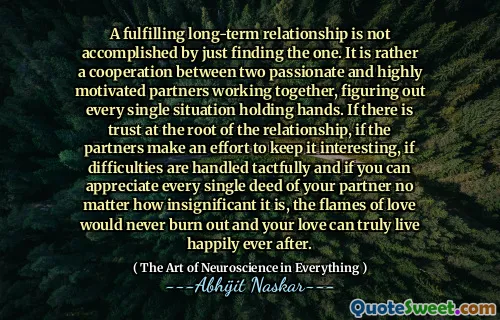
A fulfilling long-term relationship is not accomplished by just finding the one. It is rather a cooperation between two passionate and highly motivated partners working together, figuring out every single situation holding hands. If there is trust at the root of the relationship, if the partners make an effort to keep it interesting, if difficulties are handled tactfully and if you can appreciate every single deed of your partner no matter how insignificant it is, the flames of love would never burn out and your love can truly live happily ever after.
This quote eloquently captures the essence of what it takes to cultivate and sustain a fulfilling long-term relationship. It dispels the common misconception that finding 'the one' is the culmination of romantic success, instead highlighting that love requires continuous effort, teamwork, and mutual respect. The analogy of two passionate and motivated partners working together invokes the idea that relationships are dynamic collaborations, not static destinations. Trust serves as the foundation, a theme profoundly emphasized in the quote, underscoring that without trust, even the strongest connections can falter.
The quote also draws attention to the importance of appreciating every gesture, no matter how small, reflecting an attitude of gratitude that nurtures intimacy and emotional bonding. This perspective aligns with psychological insights into relationship satisfaction, where recognition and validation are crucial. The emphasis on handling difficulties tactfully speaks to emotional intelligence—learning to navigate challenges with empathy and patience, which are indispensable qualities in any lasting partnership.
Finally, framing love as a flame that can 'never burn out' if properly maintained is a powerful metaphor that evokes a sense of ongoing care and vigilance. It suggests love is both delicate and resilient, needing tender nurturing to thrive. Overall, this quote from 'The Art of Neuroscience in Everything' by Abhijit Naskar contributes an enriching understanding that love is an active, loving process—a continuous journey rather than a final achievement.






